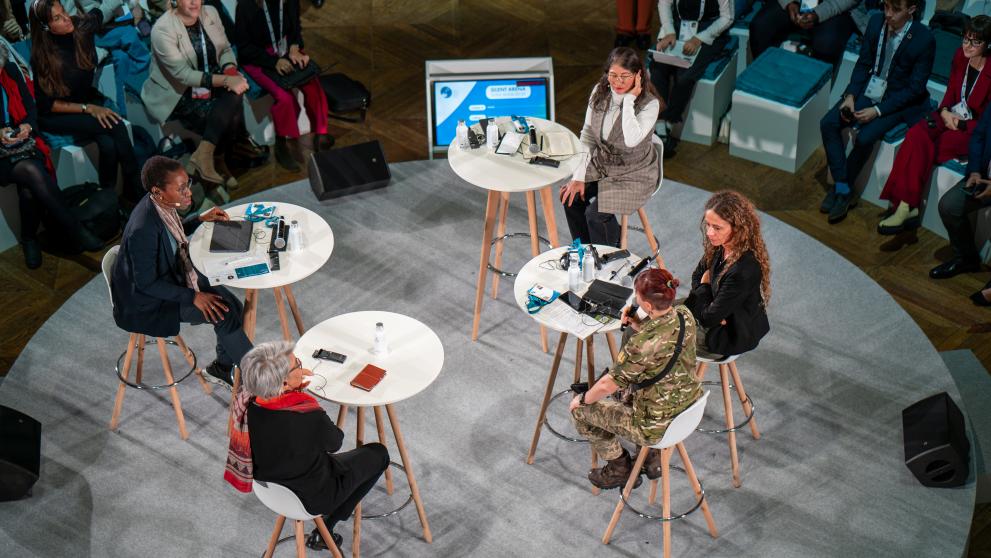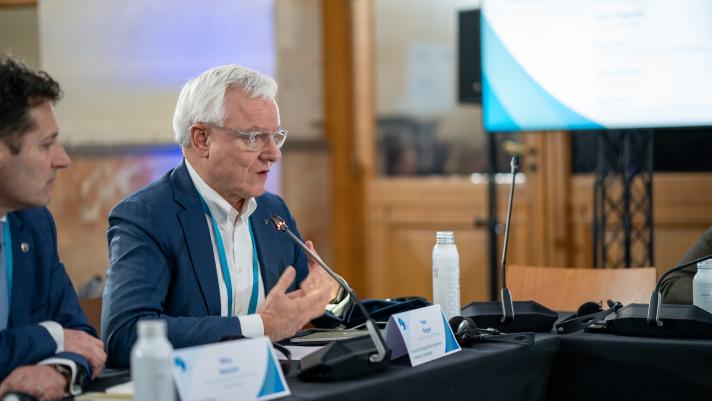
FPI organised the panel session “Female combatants: Roles and needs in conflict and post-conflict peacebuilding” with the participation of combatants from Ukraine and Colombia, the EU Special Envoy to the Horn of Africa, Annette Weber, and the International humanitarian law lawyer Elena Ambrosi, and moderation by the President and CEO of the Crisis Group, Comfort Ero. FPI’s Director, Peter M. Wagner, participated as a speaker in additional discussion and panels, among which “Stopping the war on the rules of war” and “Africa-Europe relations in the context of instability and geopolitical rivalry”.
Three projects supported by FPI were present at the PPF. The first project is the Centre for Humanitarian Dialogue (HD), which focuses on countering misinformation.
The second project, the DALIL platform, was created by Siren Analytics, and provides decentralised access to media monitoring and verification online tools throughout the Middle East and North Africa. This project was selected by the PPF among 10 new Scale-up Projects, which will benefit from tailored support, resources, and mentorship to amplify their work.
The third project supported by the FPI and presented at the PPF this year, is UNITAD. Its team of investigators is inquiring about the crimes of the Islamic State in Iraq in order to facilitate the collection of evidences which could be used in legal proceedings.
Our Director, Peter M. Wagner, shared his views on the 6th PPF edition:
Did the Forum fulfill your expectations?
Peter Wagner: Of course, because peace was at the heart of our conversations, peace is always an issue, and is even more so these days. You know, it's not my first year here, and I genuinely value the forum and the new ideas it develops.
This year, we've been discussing collectively about new technologies, their potential and opportunities, but also the risks they represent. So, I'm very happy to see that FPI, our team with our projects, are on track. It's the right place to discuss with partners in the field of peace building, conflict resolution or stabilisation. And that's, for us, really a unique place to be.
One of the organisations supported by FPI has been rewarded by the PPF. How do you feel about this? How do you see this partnership with civil society players?
Peter Wagner: We are absolutely delighted that DALIL's work has been recognised by the Forum. This recognition highlights the need to fight against disinformation, which is DALIL's core activity. They use artificial intelligence to identify dangerous, wrong narratives and hate speech.
We are very grateful for the work of our other partners, such as UNITAD that is using technological means to create databases, and an analytical tool that would allow courts in Iraq to go after war crimes committed by ISIL.
We are also very proud to work with the Centre for Humanitarian Dialogue (HD) that is trying to use traditional means of mediation among conflicting parties. For example, ahead of elections, they will build agreements with local actors not to use disinformation, how to use properly in a clean manner, social media.
And that's where also the digital age is really kicking in. Our partners are trying to address the issue of disinformation already at the source, rather than at the receiving end. All these are very innovative approaches and we will measure their impact over time.
Can you tell us about a project whose impact on the ground has been of particular interest to you?
Peter Wagner: One of the projects that impressed me the most is a project in which organisations were helping herders and farmers in the north of Nigeria to make better use of the scarce water resources. And this really sounds like something very basic, very rural, very old fashioned, but it was doing that in a modern way. They are using high resolution satellite imagery to help on the way, check who is going where, who uses which tracks and which parts of the territory. You can bring the two elements together. And that, I found, is quite a tangible impact of our work, because these two communities are now in much less conflictual relationships.
Details
- Publication date
- 21 November 2023
- Author
- Service for Foreign Policy Instruments

